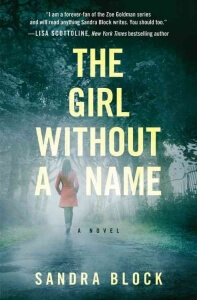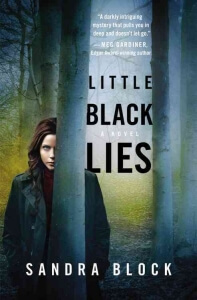Top Ten Psychological Thrillers from Lisa Unger to Jeff Lindsay…
Top Ten Psychological Thrillers from an author who has crafted a riveting new novel titled Black Lies…
Maybe it’s my neurology background, but psychological thrillers have always been my brain candy of choice. The glimpse into the shadowy recesses of a villain’s mind is often more shocking than the crime itself—the “why-dun-it” vs. the “who-dun-it.” Tracking the twists and turns of an evil mind is treacherous enough. When the storyteller also has mental health issues, we are thrown into an even deeper level of the maze. To reach the end, we must solve not only the mystery of the crime but also of the narrator’s mind.
Let’s play doctor for a moment, and take a history from ten protagonists with various neuropsychological problems.
- The Stone Boy by Sophie Loubiere. The story is a jagged read told by a mother and son, jumping forward and backward in time and laced together by a series of paranoid letters. The mother has schizophrenia, which is manageable when she takes her medications, and the son is a doctor, doing his best to keep her out of a mental institution. When the mother becomes convinced the little boy across the street is being abused, she takes on the case, visiting the child’s school, befriending his sister, and even meeting with social services. There’s only one problem: the boy may be a vivid
- hallucination, cruelly brought on by the death of her beloved grandson. In the end, we must decide along with her son—is the boy real or not?
- In the Blood by Lisa Unger. This thriller is a chess game in which we don’t fully trust the main character. She is not a psychopath but, by her own admission, pretty darn close. Struggling to lead a “normal” college life, she takes a daily cocktail of psychotropics to help her manage her impulses and her doozy of a past. Her mother was murdered, and her father (who may or may not be innocent) is in jail for the crime. When she starts babysitting a boy from the nearby school for troubled children, it seems like a case of the fox watching the hen house. But who is watching whom? In this chess game, we are always a few moves behind, not sure who killed the mother, who is the good guy and who is the bad guy, and, finally, how all of these characters intertwine.
- The Curious Incident of the Dog in the Night-Time by Mark Haddon. A story about a boy with Asperger’s who discovers the neighbor’s poodle impaled by a pitchfork—sounds like a gruesome trip! And yet, the story manages to be humorous and warm and, of course, mysterious. Just who committed this heinous act? Christopher Boone uses his methodical brain to solve the mystery in the same way he might attack a math problem. When he reaches the surprising and emotional conclusion, he must learn not only empathy but forgiveness. And as his character grows, so do we, learning to appreciate the unexpected gifts of his perplexing and sometimes frustrating mind.
- Darkly Dreaming Dexter by Jeff Lindsay. If you own a television, you’ve certainly heard of the lovable, psychopathic serial killer named Dexter, based on this series. If lovable and serial killer seem oxymoronic to you, consider this. Dexter lives and kills by a code created by his ex-police foster father. He is allowed to murder, but only bad people. In this way, he can satisfy the “howling need” in his psyche without harming society. Plus, he has the perfect cover. As a blood-spatter analyst for the Miami police, he can hide his secret life behind what he loves most—blood. As readers, we feel the fear of the victims but also judge their evil crimes and are ultimately put in the uncomfortable position of rooting for a serial killer.
- The Red Door by Charles Todd. The Charles Todd series (by a mother-son writing team) is historical fiction set in England directly after WWI. The main character, Scotland Yard Inspector Rutledge, returns from the war with “shell shock,” along with another little issue. He has a faux friend that accompanies him on all his cases, but no one else can see him. Rutledge is continually hallucinating a man named Hamish, a deserter but also fellow soldier whom he had to shoot for treason during the war. Hamish’s presence is a nagging reminder of past atrocities but also a friendly ear for present problems and an acute interpreter of suspects.
- Before I Go To Sleep by S.J. Watson. An elevator pitch for this one might be: “Memento” meets domestic suspense. The narrator is beyond unreliable; she has severe short-term memory loss. Every morning she wakes up fearful and unaware of where she is, forgetting the basics of her life, such as her name and the fact that the strange man in her bed is Ben, her husband. Her therapist helps her cope by having her keep a journal filled with daily reminders about her life. Reading the journal, she learns her story each day anew, but the words on the last page shock her: Don’t Trust Ben. But can she trust herself? Or her therapist? With each minuscule advance in memory, she inches toward the truth of her forgotten past.
- The Pocket Wife, Susan H. Crawford. This psychological thriller has similarities, at least in plot, to the Turn of the Mind. In the Pocket Wife, the main character is also accused of killing her friend, and has no recollection of the terrible act. However, here the narrator has been rendered unreliable by an afternoon of heavy drinking on top of her bipolar disorder. Her memory turns spongy during manic cycles, when the murder occurred. Add to the mix a cheating husband and a detective with his own personal strifes, and you have a perfect cast of potential suspects. And the answer to the crime is hiding deep inside a web of paranoia, drunken haziness and fractured memories.
- Turn of the Mind by Alice LaPlante. Continuing with the memory theme, we come to Dr. White, a skilled hand surgeon who in two years has descended from being the head of her department to barely remembering her children. Alzheimer’s has hit hard. Dr. White reaches out to her best friend for support, only to be reminded not only of her murder, but that the doctor herself is the main suspect. Told in brief flashbacks alongside the ever-dissolving present, we feel her terror and grief at the hands of this relentless disease. And we remain unsure until the very end—did she really kill her best friend? And if so, why?
- Lacy Eye by Jessica Treadway. In the last of our memory thrillers, Hannah Schutt suffered memory loss after a vicious attack that killed her husband and left her disfigured. To make matters worse, suspicion for the crime has fallen on her very own daughter. Though her fiancé was the only one charged, everyone wonders if the daughter aided her dominant, sociopathic lover. Now he’s out of jail on a technicality, and only Hannah’s account of that night can send him back. The problem is: she doesn’t remember a thing. She remembers everything before and after—but not that night. Scouring through old memories and fleeting flashbacks, Hannah tries her best to make sense of the brutal crime. But even her most cherished memories may be tarnished, seen through the “lacy eye” or rose-colored glasses of denial. After all these years, she comes to realize that she never really knew her family at all
- Standing Still by Kelly Simmons. Claire Cooper, a suburban mom and journalist, harbors a terrible secret that emerges in her daily life as debilitating panic disorder. She has panic attacks when editing disturbing footage, when her husband travels away from home, or even after a relatively minor disturbanc
 e of her carefully plotted life. Daily, she struggles to keep it together and not allow her rampant phobias to take over. But one night she is confronted with the most terrifying situation imaginable: an intruder entering her daughter’s room. When she offers her own life for her child’s, the kidnapper agrees. Now, Claire finds herself in the fight of her life, and in the hands of a very unlikely teacher/healer—her kidnapper.
e of her carefully plotted life. Daily, she struggles to keep it together and not allow her rampant phobias to take over. But one night she is confronted with the most terrifying situation imaginable: an intruder entering her daughter’s room. When she offers her own life for her child’s, the kidnapper agrees. Now, Claire finds herself in the fight of her life, and in the hands of a very unlikely teacher/healer—her kidnapper.
Sandra A. Block graduated from college at Harvard, then returned to her native land of Buffalo, New York for medical training and never left. She is a practicing neurologist and proud Sabres fan, and lives at home with her husband, two children, and impetuous yellow lab Delilah. She has been published in both medical and poetry journals. “Little Black Lies” is her debut, and “The Girl Without a Name” is the next novel in the series.

